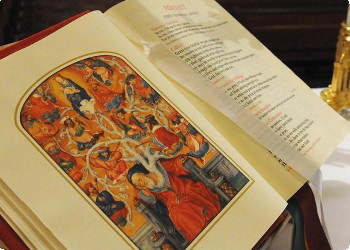A prophet is not without honor except in his native place and in his own house
1 MAY (Mt 13,54-58)
Who knows the Ancient Scripture knows that no man the Lord used until Christ Jesus was taken up in a state of “human, social, cultural, religious, political and economic greatness.” On the contrary, we do know that God has always chosen simple, small, poor, humble and unknown people, non-existent in the world that mattered. Moses himself was a pastor, a shepherd of a flock. God made him great. He did not even know how to speak. He felt awkward in his speech.
Meanwhile Moses was tending the flock of his father-in-law Jethro, the priest of Midian. Leading the flock across the desert, he came to Horeb, the mountain of God. There an angel of the Lord appeared to him in fire flaming out of a bush. As he looked on, he was surprised to see that the bush, though on fire, was not consumed. So Moses decided, “I must go over to look at this remarkable sight, and see why the bush is not burned.” When the Lord saw him coming over to look at it more closely, God called out to him from the bush, “Moses! Moses!” He answered, “Here I am.” God said, “Come no nearer! Remove the sandals from your feet, for the place where you stand is holy ground. I am the God of your father,” he continued, “the God of Abraham, the God of Isaac, the God of Jacob.” Moses hid his face, for he was afraid to look at God. But the Lord said, “I have witnessed the affliction of my people in Egypt and have heard their cry of complaint against their slave drivers, so I know well what they are suffering. Therefore I have come down to rescue them from the hands of the Egyptians and lead them out of that land into a good and spacious land, a land flowing with milk and honey, the country of the Canaanites, Hittites, Amorites, Perizzites, Hivites and Jebusites. So indeed the cry of the Israelites has reached me, and I have truly noted that the Egyptians are oppressing them. Come, now! I will send you to Pharaoh to lead my people, the Israelites, out of Egypt.” But Moses said to God, “Who am I that I should go to Pharaoh and lead the Israelites out of Egypt?” He answered, “I will be with you; and this shall be your proof that it is I who have sent you: when you bring my people out of Egypt, you will worship God on this very mountain.”
“But,” said Moses to God, “when I go to the Israelites and say to them, ‘The God of your fathers has sent me to you,’ if they ask me, ‘What is his name?’ what am I to tell them?” God replied, “I am who am.” Then he added, “This is what you shall tell the Israelites: I AM sent me to you.” God spoke further to Moses, “Thus shall you say to the Israelites: The Lord, the God of your fathers, the God of Abraham, the God of Isaac, the God of Jacob, has sent me to you. “This is my name forever; this is my title for all generations. “Go and assemble the elders of the Israelites, and tell them: The Lord, the God of your fathers, the God of Abraham, Isaac and Jacob, has appeared to me and said: I am concerned about you and about the way you are being treated in Egypt; so I have decided to lead you up out of the misery of Egypt into the land of the Canaanites, Hittites, Amorites, Perizzites, Hivites and Jebusites, a land flowing with milk and honey. “Thus they will heed your message. Then you and the elders of Israel shall go to the king of Egypt and say to him: The Lord, the God of the Hebrews, has sent us word. Permit us, then, to go a three days’ journey in the desert, that we may offer sacrifice to the Lord, our God.(Ex 3, 1-18).
It is God who makes a person great. He always takes non great people. He takes them small, poor, humble, of low social status, so that all his omnipotence of grace, truth, holiness and perfect justice is manifested in them. The inhabitants of Nazareth obviously do not know their history. Of their fathers they remember the greatness conferred on them by God, they ignore their human littleness before the call.
He came to his native place and taught the people in their synagogue. They were astonished and said, “Where did this man get such wisdom and mighty deeds? Is he not the carpenter’s son? Is not his mother named Mary and his brothers James, Joseph, Simon, and Judas? Are not his sisters all with us? Where did this man get all this?” And they took offense at him. But Jesus said to them, “A prophet is not without honor except in his native place and in his own house.” And he did not work many mighty deeds there because of their lack of faith.
Jesus is socially poor and humble. At least that is the appearance. It should have been just this appearance the one to convince those of Nazareth of the truth of his vocation to be the Messiah of the Lord. David was a shepherd. Moses was a shepherd. Jacob was a shepherd. Never must this truth be forgotten.
Virgin Mary, Mother of the Redemption, Angels and Saints give us the intelligence of the truth.





